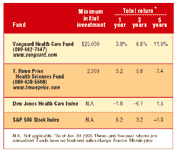Article
Funds of the Month
Healthcare funds
The healthcare industry has gone through some rocky times recently. The pharmaceutical industry has been particularly hard hit: the word "Vioxx" is enough to send shivers up investors' spines. As generics represent a larger slice of the pie, questions are being raised about their quality and efficacy. Lower-priced drugs imported from Canada undercut manufacturers' profits.
But the long-term outlook is optimistic. By 2013, spending on healthcare could double from the $1.67 trillion reported in 2003. The number of Americans over 65, who already account for more than one-third of the nation's healthcare spending, is projected to double in the next 30 years. Since older people typically need more medical care, the demand should be relatively immune to economic cycles.
Drug sales are also increasing-by about 10 percent annually in the US. And the growth rate for pharmaceutical sales worldwide is about 8 percent. Those numbers put growth for the pharmaceutical industry slightly higher than the projected long-term growth rate for all American businesses, which is 6 percent to 7 percent annually.
One downside: Vanguard Health Care requires a minimum initial investment of $25,000. The high amount is designed to limit the size of the fund and encourage a long-term commitment from the investor. Vanguard says investors in its healthcare fund should have a time horizon of at least five years.
T. Rowe Price Health Sciences Fund. While this fund owns healthcare bellwethers Wyeth and Amgen, manager Kris H. Jenner is betting on the nascent biotechnology arena. The fund's 46 percent weighting in that portion of the industry is considerably larger than that of its peers.
Jenner's focus on biotech and small-cap companies may also improve the odds of delivering superior long-term returns. He has taken a relatively aggressive stance since 2000, making good use of T. Rowe Price's research strengths.






